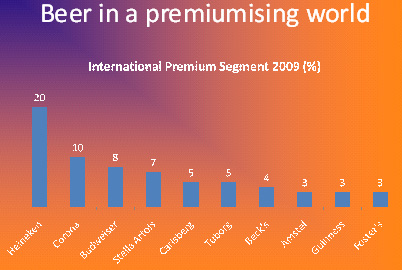Carlsberg Germany to be sold to Radeberger Group?
Poor souls. Having endured one restructuring after another, the recent rumour that Danish brewer Carlsberg will sell its local subsidiary will do little to put the minds of its German employees to rest. Carlsberg’s German unit Holsten (together with the Lübz brewery) continues to be churned through the rumour mill. About 18 months ago competitors alleged Carlsberg would close down its Holsten brewery in Hamburg and relocate production to Lübz. In March 2011, the German trade publication Inside speculated that Carlsberg Germany could be sold lock, stock and barrel to Radeberger Group. The privately-owned Radeberger Group happens to be Germany’s number one brewer and a few years ago was said to be in talks to acquire AB-InBev’s German unit.
While there is no denying that Radeberger Group is on the prowl to increase its market share to 20 percent from currently 13 percent, it’s far from clear which brewer could be Radeberger’s next target.
Although Carlsberg’s German top honchos were quick to deny that the group was for sale, employee representatives felt far from reassured. “The employees are extremely concerned,” the leader of Holsten’s works council, Rolf Dietzsch, told German media on 5 April 2011. “As far as we are concerned, a sale of Holsten has not clearly been refuted. Employees want to know the company’s future strategy.” Last year alone 80 jobs were axed at the Holsten brewery. Restructurings are a regular feature. “This does not contribute to employee motivation,” Mr Dietzsch reportedly said.
Carlsberg’s employees are right to be worried. Market observers have long wondered when – not if – Carlsberg’s German unit will be sold. The theory that Carlsberg only bought the German Holsten brewery group in 2004 to protect the southern glacis of its Scandinavian Fortress, to speak in military terms – never convinced us.
Like most brewers in Germany, Carlsberg has been suffering from declining beer consumption. In 2010 Carlsberg’s beer sales fell to 3.2 million hl and Carlsberg’s ranking among German brewers to 8th, according to Dr Kelch’s market research for BRAUWELT. In 2008, Carlsberg still sold 4.8 million hl beer but that was before it sold two breweries: one to the cheap-beer-producer Oettinger and the other to the contract brewer Frankfurter Brauhaus.
Many think that after this string of disposals, Carlsberg Germany has very little left to justify its presence in Germany.
Still, on 5 April 2011, about 250 of Carlsberg’s employees in Hamburg were asked to gather outside and form a 17 metre crowd in the shape of a Carlsberg bottle in celebration of the new global slogan “that calls for a Carlsberg”.
Carlsberg’s CEO Jørgen Buhl Rasmussen said in a statement that while Carlsberg’s green logo is known around the world, its sales do not measure up to its brand recognition.
Carlsberg said it will introduce new packaging for the beer in more than 140 markets, hoping that the new branding will help it reach its goal to become the fastest-growing global beer company.
“Consequently, by 2015, Carlsberg anticipates that the Carlsberg brand will have doubled its profits,” the company said.
Currently, the Carlsberg brand sells about 6 million hl world-wide (excluding its market of origin).


